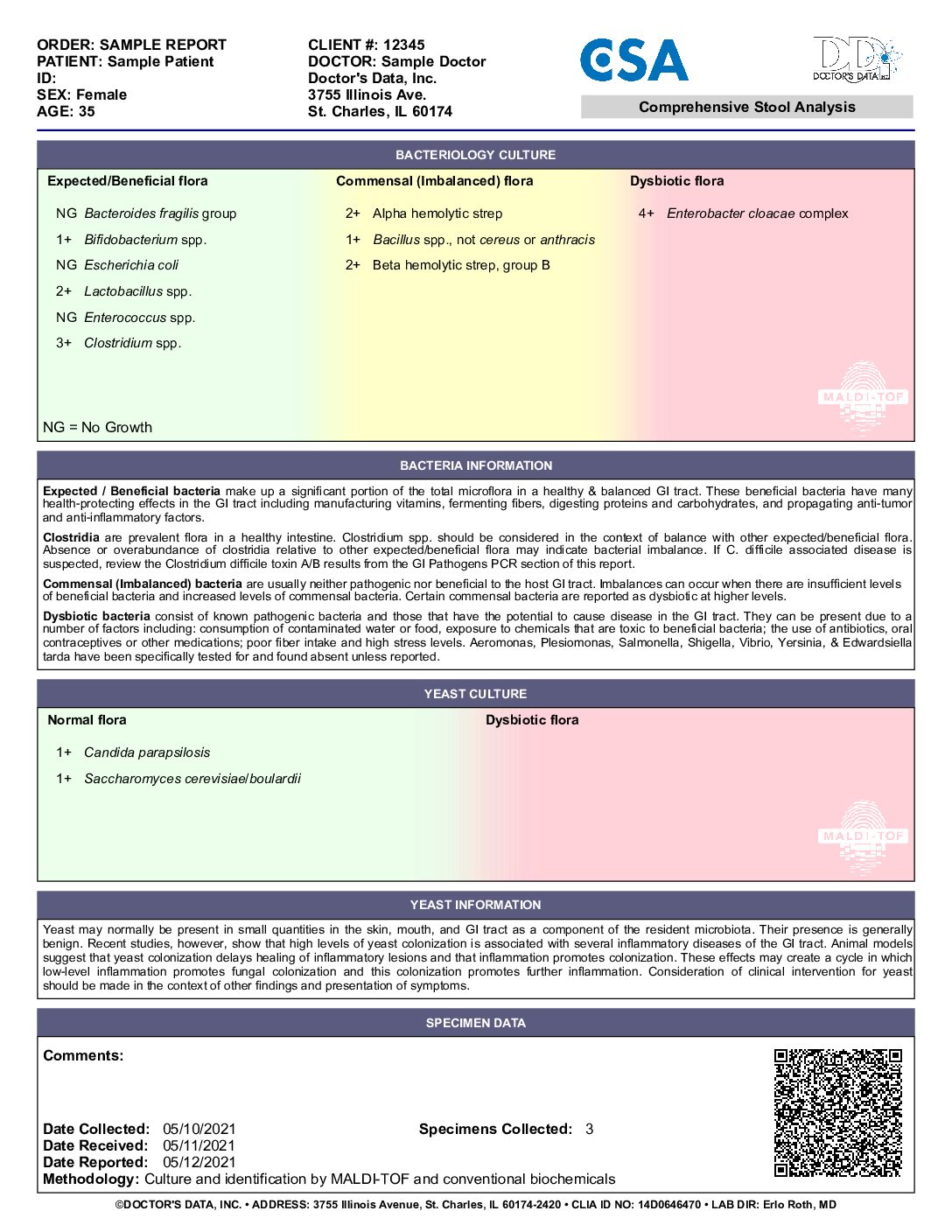Description
Sample Report Comprehensive Stool Analysis
Test Specimen: Stool
Test Analytes:
Acetate, Additional pathogens culture, Bacteriology culture, Butyrate, Calprotectin, Carbohydrates, Elastase, Fat Stain, Lactoferrin, Lysozyme, Mucus, Muscle fibers, Occult Blood, Propionate, Red Blood Cells, Valerate, Vegetable Fibers, White Blood Cells, Yeast Culture, pH, Secretory IgA
Gastrointestinal complaints are among the most common reasons that patients seek medical care. Symptoms associated with GI disorders include persistent diarrhea, constipation, bloating, indigestion, irritable bowel syndrome and malabsorption. The Comprehensive Stool Analysis is a simple stool test that can help assess digestive and absorptive functions, the presence of opportunistic pathogens and to monitor the efficacy of therapeutic remediation of GI disorders. Antimicrobial susceptibility testing to prescriptive and natural agents is also performed for appropriate bacterial and fungal species at no additional charge.
This test is useful for
- Gastrointestinal Symptoms
- Mood Disorders
- Autoimmune Disease
- Joint Pain
- IBD/IBS
- Inflammation
- Food Sensitivities
- Nutritional Deficiencies
- Skin Conditions (Atopic Dermatitis)
Detailed Information
The Comprehensive Stool Analysis is an invaluable non-invasive diagnostic assessment that permits practitioners to objectively evaluate the status of beneficial and imbalanced commensal bacteria including Clostridium species, pathogenic bacteria and yeast/fungus. Precise identification of pathogenic species and susceptibility testing greatly facilitates selection of the most appropriate pharmaceutical or natural treatment agents.
Important information regarding the efficiency of digestion and absorption can be gleaned from the measurement of the fecal levels of elastase (pancreatic exocrine sufficiency), fat, muscle and vegetable fibers, and carbohydrates.
Inflammation can significantly increase intestinal permeability and compromise assimilation of nutrients. The extent of inflammation, whether caused by pathogens or inflammatory bowel disease (IBD), can be assessed and monitored by examination of the levels of biomarkers such as lysozyme, lactoferrin, white blood cells and mucus via this stool test. These markers can be used to differentiate between inflammation associated with potentially life-threatening inflammatory bowel disease (IBD), which requires lifelong treatment, and less severe inflammation that can be associated with irritable bowel syndrome (IBS) which is frequently due to the presence of enteroinvasive pathogens. Lactoferrin is only markedly elevated prior to and during the active phases of IBD, but not with IBS. Monitoring fecal lactoferrin levels in patients with IBD can therefore facilitate timely treatment of IBD, and the test can be ordered separately. Since the vast majority of secretory IgA (sIgA) is normally present in the GI tract, where it prevents binding of pathogens and antigens to the mucosal membrane, it is essential to know the status of sIgA in the gut. sIgA is the only bona fide marker of humoral immune status in the GI tract.
Cornerstones of good health include proper digestion of food, assimilation of nutrients, exclusion of pathogens and timely elimination of waste. To obtain benefits from food that is consumed, nutrients must be appropriately digested and then efficiently absorbed into portal circulation. Microbes, larger-sized particles of fiber, and undigested foodstuffs should remain within the intestinal lumen. Poor digestion and malabsorption of vital nutrients can contribute to degenerative diseases, compromised immune status and nutritional deficiencies. Impairment of the highly specific nutrient uptake processes, or compromised GI barrier function, as in “leaky gut syndrome,” can result from a number of causes including:
- Low gastric acid production
- Chronic maldigestion
- Food allergen impact on bowel absorptive surfaces
- Bacterial overgrowth or imbalances (dysbiosis)
- Pathogenic bacteria, yeast or parasites and relate dtoxic irritants
- The use of NSAIDs and antibiotics
Impairment of intestinal functions can contribute to the development of food allergies, systemic illnesses, autoimmune disease, and toxic overload from substances that are usually kept in the confines of the bowel for elimination. After performing a stool test, efficient remediation of GI dysfunctions incorporates a comprehensive guided approach that should include consideration of elimination of pathogens and exposure to irritants, supplementation of hydrochloric acid, pancreatic enzymes and pre- and probiotics, and repair of the mucosal barrier.
The Comprehensive Stool Analysis does not include analysis for parasites.




